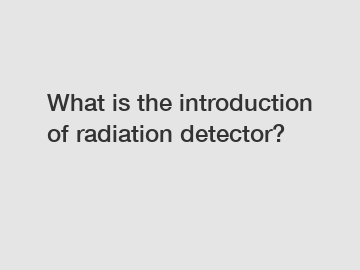What is the introduction of radiation detector?
Introduction of Radiation Detector
Radiation detectors are devices used to detect, track, and measure different forms of radiation, such as ionizing radiation. These detectors are essential for various applications, including medical imaging, radiation therapy, nuclear power plants, and environmental monitoring.Step 1: Understanding the Basics
Before discussing the intricacies of radiation detectors, it is important to understand the basics of radiation. Radiation is energy that is emitted from a source and travels through space. Ionizing radiation, in particular, has enough energy to remove tightly bound electrons from atoms, creating charged particles.Step 2: Types of Radiation Detectors
There are several types of radiation detectors, each with its own unique properties and applications. Some common types of radiation detectors include Geiger-Mueller counters, scintillation detectors, and semiconductor detectors.Step 3: Working Principle
Radiation detectors work based on various principles, such as ionization, scintillation, or semiconductor technology. Ionization detectors, like Geiger-Mueller counters, detect radiation by ionizing gas molecules. Scintillation detectors work by converting radiation energy into visible light, which is then detected by a photomultiplier tube. Semiconductor detectors use the electrical conductivity of semiconductors to detect radiation.Step 4: Applications
Radiation detectors have a wide range of applications in different fields. In medicine, radiation detectors are used in devices like X-ray machines, CT scanners, and PET scanners for diagnostics and treatment. In nuclear power plants, radiation detectors monitor radiation levels to ensure safety. Environmental monitoring uses radiation detectors to measure radiation levels in air, water, and soil.Step 5: Safety Precautions
When working with radiation detectors, it is essential to follow safety protocols to protect against exposure to radiation. Users should be trained on how to safely handle and operate radiation detectors, wear appropriate protective gear, and work in designated areas with proper shielding.In conclusion, radiation detectors play a crucial role in various fields by detecting and measuring ionizing radiation. Understanding the basics, types, working principles, applications, and safety precautions associated with radiation detectors is essential for their efficient and safe use.Are you interested in learning more about radiation detection and measurement solutions, q switch driver, acousto-optic q-switch driver? Contact us today to secure an expert consultation!
Explore more:How can I test my radiation level at home?
Why is it important to measure radiation?
Keyword: Virtual reality Topic: Virtual reality: Is it time for a reevaluation?
7 Must-Have Radiation Detection Instruments for Safety
Revolutionizing Safety: Handheld Radiation Detector Essential?
Which Radiation Detector Name Will Revolutionize Safety?
Which electronic detecting device is the safest?

What is the best laser cutter for brass?
10 Questions You Should Know about Impeller Feeder
4 Tips to Choose a Twin Paddle Mixer
The Best Supplies and Packing Advice for Making Moving ...
What is the purpose of an industrial boiler?
What's the preparatory work for setting up a sunflower ...
Revolutionizing recycling: The rise of cardboard shredders?










